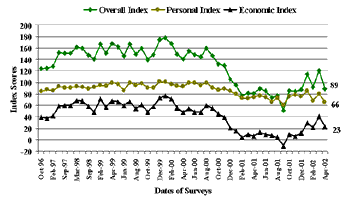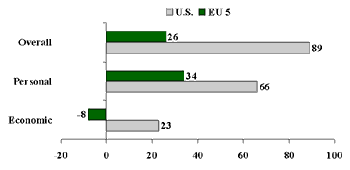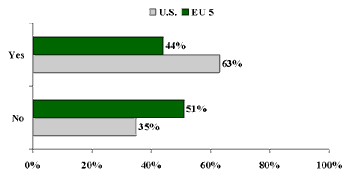GALLUP NEWS SERVICE
New Gallup/UBS Index of Investor Optimism -- U.S. poll data (April1-14) show overall U.S. investor optimism plunged to 89 in April -- down 32 points from March (121). This puts the Index back near its February (92) and December 2001 (88) levels. In essence, investor optimism in 2002 has been little changed since October 2001 (86), when it bounced back from the events of 9/11.
| Index of Investor Optimism -- U.S. October 1996 to April 2002 |
 |
Probably the most important aspect of the U.S. Index in recent months is its extreme volatility. The enormous swings in investor sentiment clearly reflect uncertainty about the strength of the economic recovery. In this regard, investors seem to have adopted the same wait-and-see attitude toward the recovery as Federal Reserve Board Chairman Alan Greenspan has. In his testimony to the Joint Economic Committee last week, he exhibited considerable caution about whether there would be enough consumer demand to keep the recovery going at a strong pace during the months ahead.
Eighty percent of those investors who have an opinion on Fed policies right now (April 2002) say they support the Fed's current approach to the economy -- perhaps because of the Fed's caution and its hesitancy to raise rates. As far as the general public is concerned, more than two out of three Americans (69%) say they have a great deal (25%) or a fair amount (44%) of confidence that the Fed Chairman will do or recommend the right things for the U.S. economy -- not bad given the recent recession, even if it has been mild.
U.S. Investor Optimism is Extremely Volatile
The Index of Investor Optimism -- U.S. surged in January, moving up 27 points to 115 from 88 in December 2001. During February, the U.S. Index plunged 23 points to 92, giving up almost all of its January gain. In March, overall U.S. investor optimism jumped again by 29 points, increasing to 121. Now in April, the U.S. Index has plummeted once more by 32 points to 89 -- leaving it just where it was in December of last year.
The Personal Dimension of the U.S. Index has shown both volatility and weakness during recent months. In January, the Personal Dimension increased nine points to 85 from 76 in December 2001. During February, it plunged 16 points to 69 -- giving up more than it had gained in January. In March, the Personal Dimension surged again by 11 points, increasing to 80. Now in April, it has dropped once more by 14 points to 66, leaving it just five points above its all time low point of 61 during September of last year
The Economic Dimension of the U.S. Index has also been capricious during recent months. The Economic Dimension increased from 12 in December to 30 in January 2002. It then decreased to 22 in February before increasing again to 41 in March. In April, it fell once again to 23. Still, the Economic Dimension is far above its December 2001 level of 12 and no where near its all time low of 11 during September of 2001.
The comparative strength of the Economic Dimension of the U.S. Index suggests that investors are still fairly positive about the economic outlook for the next six months. The weakness of the Personal Dimension of the U.S. Index, however, suggests that the underlying strength of the economic recovery is yet to be realized by the majority of U.S. investors. This would appear to add support to the Fed's caution as it considers the potential for increased consumer demands in the months ahead.
EU5 Investor Optimism Also Decreases in April
During October 2001, an Index of Investor Optimism -- EU5 baseline survey was conducted in five countries in Europe: France, Germany, Great Britain, Italy, and Spain. As a result of this survey, the baseline for the Index of Investor Optimism -- EU5 was established at 4. The Personal Dimension was established at 33, and the Economic Dimension was established at 29.
In January 2002, the Index of Investor Optimism -- EU5 increased 36 points from its October 2001 level, reaching 40. In February, the EU5 Index declined to 20 before increasing to 32 in March. In April, the EU5 Index fell once more to 26. While the EU5 Index has also shown volatility over the first four months of 2002, it remains far above its low point found in October 2001. At the same time, it is also somewhat below its January 2002 high.
| Index of Investor Optimism -- U.S. &
EU5 April 2002 |
 |
| Results are based on telephone interviews with a
representative sample of investors from France, Germany, Great
Britain, Italy and Spain, age 18 years or older. Investors are
those who have stocks, bonds, and/or mutual funds with a total
worth of at least 10,000 Euros. For results based on the total sample of investors, one can say with 95% confidence that the margin of sampling error is ± 4 percentage points. |
As was the case in the United States, the Personal Dimension of the EU5 Index has shown both volatility and weakness. The Personal Dimension of the EU5 Index increased to 42 in March -- up five points from its February 2002 level of 37. Then it fell again in April to 34 -- leaving it just one point above its nadir (33) of October 2001.
While the Economic Dimension of the EU5 Index has also been unstable and negative, in April of 2002 it remains far above its October low point (-29). It appears that Europe, like Japan, is waiting for the United States to lead the way to economic recovery.
Fewer U.S. Investors Say it is a Good Time to Invest
For most of the past several years, two-thirds or more of American investors have said that it is a good time to invest. Neither the events of 9/11 nor the nonexistent investment returns of 2001 have changed investors' strongly held position.
Still, in April 2002, only 63% of U.S. investors say that now is a good time to invest in the financial markets. This is the lowest percentage since September 2001, when only 53% of investors said it was a good time to invest.
Reflecting the much lower level of investor optimism in Europe, less than half (44%) of European investors said that now was a good time to invest in the financial markets. And, despite all the volatility in European investor optimism during early 2002, this percentage has remained at about the same level (46%) it was at in October 2001.
| Good Time to Invest in the Financial
Markets? April 2002 |
 |
| Question: Do you think now is a good time to invest in the financial markets, or not? |
Survey Methods
Results for the Gallup/UBS Index of Investor Optimism -- U.S. are based on telephone interviews with a randomly selected U.S. sample of 1,006 adult investors, 18 years and older, with at least $10,000 of investable assets, conducted April 1-14, 2002. Results for the Gallup/UBS Index of Investor Optimism -- EU5 are based on randomly selected samples of approximately 200 investors each in France, Germany, Great Britain, Italy, and Spain conducted April 1-14, 2002.
For results based on this sample, one can say with 95 percent confidence that the maximum error attributable to sampling and other random effects is plus or minus 3 percentage points. In addition to sampling error, question wording and practical difficulties in conducting surveys can introduce error or bias into the findings of public opinion polls.
